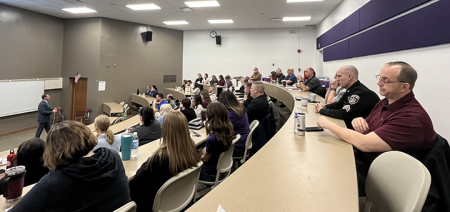Point/Counterpoint: Should We Legislate Where Sex Offenders Can Live?
Published:
April 26th, 2010
By:
Tyler Murphy

Evening Sun reporters love to argue. For the purposes of this debate, sides were chosen arbitrarily and do not necessarily reflect the author’s true viewpoint.
A public hearing will be held on May 10 for a proposed local law that would establish residency and proximity restrictions in Chenango County for sex offenders. The legislation was offered by Chenango County Sheriff Ernest Cutting as what he called “a campaign promise” during his bid for election to the position last summer. It would target sex offenders who have committed criminal offenses against minors.
---
This is political suicide, but I’m going to have to advocate for the rights of convicted sex offenders. Convicted offenders are pursued more vigorously by the justice system and the community than those committing acts of gross violence or drug-related crimes, including those involving children. It matters not how long ago your crime was or what the underlining abuse may have been. As it stands in New York even the lowest level sex crime requires 20 years of registration. That includes all forms of illegal acts, including the more socially understandable and consensual interaction between teens caught in the 16 to 19 year-old gray area of statutory rape to the aggressive, older, pedophile who stalks an elementary school playground. The system does not separate the different categories of offenders into clear enough sections for the public to understand their actual crime. Restricting a person’s right to live from an area based on a criminal conviction is sort of like how they first started taxing cigarettes and how those fees climbed out of control and how the government is now trying to spread the idea to other products. It’s an easily assumed political position with a number of splendid publicity banners, but it’s a first step to compromising the rights of those falling into the justice system long after they’ve already served the time for the crime. – TDM
You draw an interesting parallel between the taxation of cigarettes and the regulation of convicted sex offenders to support your argument, but it actually supports mine. The two are analogous because of their long-term propensity to hurt, damage or even kill. I’m not convinced that barring a convicted sex offender (and I believe you’ll trust that the law has to be objective in these matters) from living within 500 feet of a school or playground is violating their civil rights. We’re not talking about banishing them to some far-off island here, we just don’t want them living right next door to places where children congregate. Letting them live so close is creepy and dangerous, and I dare say tempting for those individuals who’ve shown a propensity for deviant behavior in the past. – JMG
I know this is a revolutionary idea in our times, but just because you’re a prisoner, just because you’ve been convicted of a crime, even a sex crime, doesn’t mean you don’t have rights. The reality is we aren’t executing these people and that they must one day rejoin society. If they’re so dangerous, why are we letting them rejoin at all? How can you say there’s such a serious chance of reoffense that we need to monitor a person, restrict where they live and post their information to warn the public, but they are OK to be released? Let’s not forget to mention there is no conclusive research demonstrating that restricting a person’s residence in any way affects their chance to reoffend. Is the reasoning behind creating the law to prevent an incident from happening, to keep a predator from hunting? If it was shown those committing drug crimes were also likely to reoffend, should we monitor them too, or any crime for that matter? Wouldn’t it be more reasonable to increase sentences for sex crimes? At least the courts have the resources to deal with defendants on a case by case basis instead of punishing all offenders in general, including those who don’t reoffend. – TDM
I think where we differ in our philosophies here is that you somehow believe pedophilia or other sex crimes to be choices; they are not. A burglar chooses to ... burgle. A rapist, a child molester – they’re driven by compulsion, not choice. And you’re right, I’m not entirely convinced that our penal system adequately accounts for that by simply making them serve time. Years behind bars isn’t likely to change the errant, deviant behavior evident in sex offenses. It is indeed a sickness, and one that’s sadly not likely to be treated or cured – and if you take a look at recidivism rates for sex-related crimes, I think you’ll see I’m right. Again, legislating where these people can’t live (and we are again talking feet here, not miles) isn’t hampering their ability to live an otherwise productive life. But it is taking an extra measure (one whose efficacy really is never going to be quantifiable) to ensure the safety of our children, and our own peace of mind. – JMG
The idea behind the law is protecting people, especially children, from repeat sex offenders. Being an advocate and claiming it’s based on recidivism, can you tell me how many reoffend? The argument of using numbers to justify taking action against a person for a crime they might commit based on where they fall in a statistical graph is one I wholeheartedly disagree with. I admit to also feeling a need to protect people, but I don’t understand why sex offenders need special treatment compared to other criminals and why our current tools in the justice system can’t get the job done. I’m even more concerned by where the power to create these new restrictions comes from and who is in charge of drawing the lines. Maybe it’s 500 feet now, but tomorrow a new politician needing to look like he’s tough will announce a 5,000 foot plan instead – maybe we could just pass a law to keep them out of the county altogether. I’m not concerned with the 500 feet Jeff, and I am concerned with protecting kids, but I’m also concerned with the principles we’re paving for future legislation. All this being said and done, do you really think it actually works? I say you could pass a law prohibiting offenders to live within a mile and those willing would still find a way to abuse. The logic of the law is flawed and it comes at too high a price. The sad thing is we don’t even know if these kinds of laws even work as a deterrent, but at least they look good in newspaper. – TDM
You know the only number I’m concerned with? One. One child saved from a moment of horror and lifetime of pain. One convicted criminal barred from the constant temptation of committing another crime. One law which doesn’t really hurt or hinder anyone, but may in fact make a tremendous difference. One community safe and secure in the knowledge that it’s taken a simple measure to protect itself, no matter how small. – JMG
Author: Tyler Murphy - More From This Author
Comments




